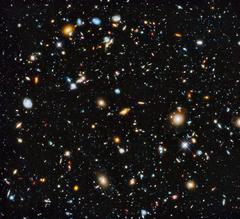URL: https://www.desy.de/news/news_search/index_eng.html
Breadcrumb Navigation
DESY News: Rafael Porto awarded Buchalter Cosmology Prize 2020
News
News from the DESY research centre
Rafael Porto awarded Buchalter Cosmology Prize 2020
For groundbreaking work on the origin of structure in the universe, DESY Lead Scientist Rafael Porto has been awarded the Buchalter Cosmology Prize 2020 together with his colleague and co-author Daniel Green from the University of California at San Diego. Their recent study “Signals of a Quantum Universe” won the first prize of the award announced at the annual meeting of the American Astronomical Society on Tuesday. The two scientists have proposed a novel test to prove the quantum origin of the large-scale structure in the cosmos. The new method is the first within practical reach.

Rafael Porto (l), Lead Scientist at DESY, and Prof. Daniel Green from the University of California at San Diego (r). Credit: DESY, Marta Mayer, and University of California at San Diego
Quantum physics tells us that pairs of particles can be spontaneously created from the vacuum. Usually, these particles annihilate each other after an extremely brief moment of existence. However, during inflation, such pairs would have been separated much faster than they could annihilate and could have given rise to the seed for the structures we see today. For instance, certain spatial correlations among the placement of galaxy clusters can be explained by this model. But, these correlation could also originate from classical, random density perturbations in the early cosmos.

Although certain particle decays during inflation could also give rise to three correlated spots on the sky, their pattern would be different from the quantum vacuum scenario. With the next generation of astrometry satellites like the European Space Agency ESA's Euclid, Porto and Green hope such three-point correlations between (three) galaxy clusters can be observed, providing the necessary data for the analysis. Porto's and Green's method was recognised as “a novel and remarkable way to unambiguously prove the quantum origin of large-scale cosmological structure, which could in turn lead to proving the quantum nature of gravity” by the judging committee of the award.
The Buchalter Cosmology Prize is an annual award that seeks to stimulate ground-breaking theoretical, observational, or experimental work in cosmology that has the potential to produce a breakthrough advance in our understanding. It was created to support the development of new theories, observations, or methods, that can help illuminate the puzzle of cosmic expansion from first principles. The first prize is endowed with 10 000 US Dollars.
www.buchaltercosmologyprize.org
Reference:
Signals of a Quantum Universe; Daniel Green and Rafael A. Porto; Physical Review Letters, 2020; DOI: 10.1103/PhysRevLett.124.251302




